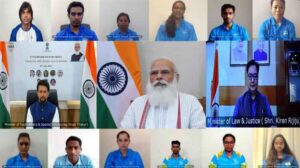She was standing along the porch, watching the sunset. The vermilion shades of the sky were reflecting on her face and the impression of the bright yellow sun in her dark eyes. Her long hair was tied in a big bun with a few strands falling on her face. Her knee-length dress had purple flowers on a white base, adorned with the chicken laces on the sleeves and bottom. Her left arm was resting on the railings, while fingers of the right hand were writing something in the air. She was lip-syncing an old Bangla song.
The clock behind her was about to strike seven. And he was coming towards the main gate of their house. He had never been late for a single second. His grey hair was shining with a few white streaks. He was wearing a short half-sleeved brown checked shirt and loose black double pleat trousers with black leather sandals. His thick glasses were making a convex shape of his eyes gazing at her.
As soon as she saw him coming, she opened the gate for him and headed towards the kitchen. She kept a pan on the stove, boiling two cups of water. She had turned fifteen last October on the first day of Durga Puja. And he was completing his fifty-seven, but still, she was her mentor. She did everything for him, from cooking to washing to ironing clothes, making his bed, and cleaning the house. Her soul had been imprisoned in this house for years. She had hardly left it in a very long time. As the water started boiling, she poured two spoonfuls of Darjeeling tea leaves into it. She opened the sugar pot, but it was empty. She walked towards the Puja room to fetch the sugar from the big can.
Also Read: Love across merging timelines: Short Story
He called her with a gruff voice, Pakhi.
She turned towards him. He asked her to oil his hair. She forgot about the sugar and rushed for the coconut oil. She started oiling his grey hair. He was sitting in an armchair, with his hands resting on it and head resting on its back. She stood behind the chair, poured some oil on her palms and her thin fingers started dancing on his scalp.
He took a long breath and sighed, Pakhi you remember Dasgupta, she nodded though her father couldn’t see it. He continued, he is no more, he left us today. A tear dropped on her cheek. He didn’t come to the office today. I called his home. His son picked up the phone and told me that Dasgupta left for the office this morning and walked around 10 meters from the house when a motorcycle with two men halted close to him. And the man sitting behind the driver took out a black revolver to fire two bullets at him. Hearing this I hung up the phone and went to the site. The police were still there and a white silhouette was drawn around Dasgupta’s body. He fell with his face up and one leg folded over the other, one hand high from his head and the other one on his chest holding a rolled newspaper. When I entered his house, his wife, sobbing heavily, was sitting at the entrance gate. His body was still with the police and they were investigating. They were trying to find out the assailants. His son, Subroto, introduced me to the Inspector who was handling the case. He started asking me about Dasgupta’s friends and enemies.
Pakhi stopped oiling her father’s hair, her fingers became stiff but were still on his scalp. Her eyes went dark with the tears mixing with the kajal, looking like the black tea she had forgotten on the stove. Her breath was choked. She could only hear, could not express, speak or even cry her heart out. She had gone mute after her mother was killed in the same manner when she was five. Her father kept telling her the details of Dasgupta’s murder. But Pakhi had whirled down into a vortex of memories.
It’s been ten years now and she was too young then, but she remembered everything. Her mother was sitting on the floor of the porch, plucking spinach leaves, some eggplants with a knife were kept in a basket. She was going to make spinach with eggplant. The time was six in the evening, and Pakhi was playing around with a wooden house. Her mother wore sarees, that day she was wearing a turquoise tant saree with black borders. Pakhi remembered that her mother was more beautiful than she was now. A small radio, alongside the wall, played Bangla songs her mother loved.
Also Read: Hostage: Short Story
She was trying to copy her mother and singing the song with her. She didn’t know that these would be her last vocals. Suddenly, a thin, slender man came on a bicycle, a red towel was tied around his face. He jumped off his cycle in front of the entrance gate and entered the porch. In a second, before Pakhi or her mother could understand his motive, he took out a knife from his pocket. This knife was bigger and sharper than the one kept in the basket with eggplants. He pushed the knife into her mother’s abdomen splattering Pakhi’s face with the blood. She closed her eyes and screamed at the top of her voice. She didn’t remember what happened next.
When she opened her eyes, she was in her father’s lap. He was sitting by the scattered spinach leaves which were no longer green. Her mother’s dead body lied beside her. One leg folded over the other, one hand high from her head and the other one on her stomach, stained with blood. Her gold ornaments were missing from the body. The policemen and neighbours gathered around the house. A white silhouette was drawn around her mother’s body. And the police were asking Pakhi about the man: who he was, what he looked like, and more. But she could not say a word, she had gone mute.
(Short story ‘The mute bird’ is written by author and designer Somya Sweta. She is based in Greater Noida, U.P.)









Resemblance: A short story
Mkulu (Old Man): A short story
Be my bride: Short Story